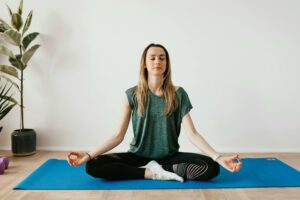We are not sleeping very well these days. A lot of us are overworked, stressed and taking part in activities throughout the day that are making it harder for us to get a good night’s sleep. We try to fight through the sleepiness with caffeine and “catching up” on the weekends, both of which actually hurt our ability to get regular, restful sleep.
And sleep is very important to our health! On a daily basis, lack of sleep has a proven negative effect on our mental performance including memory, concentration and ability to complete tasks. But longterm, sustained lack of sleep has been connected to shorter life expectancy and development of chronic diseases. In other words, if you are consistently running on less sleep than your body requires (8 hours for most of us), you are more likely to die at a younger age than you would be otherwise.
And no, you cannot just catch up on sleep on the weekends or after this stressful period of your life. Unfortunately your brain is not like the bank that you can take sleep loans from (wouldn’t that be nice!). The brain requires sleep to function properly. Sleep is the time when the brain converts short term memories to long term so you can remember beyond what you did yesterday. The brain also uses this time to forget things that are not important for survival and clear out metabolic waste. Beta-amyloid is one such metabolic waste product that the brain clears during sleep and the buildup of which is a hallmark of Alzheimer’s.
So we need sleep to function in the short term and live in the long term, but that is sometimes easier said than done! Sometimes you have every intention to go to sleep and your mind won’t let you. Other times you will be sleeping soundly, only to be woken up and be unable to get back to sleep. The good news is that these are very common scenarios and we’ve developed a lot of natural, lasting methods for correcting these issues. I’ve listed 5 of my favorite natural sleep tips below, and I will be listing 1 tip every day of the month on the Balance Wellness Facebook page if you want more!
- Avoid alcohol – This one is counterintuitive for anyone who has felt drowsy after a drink or 2, but alcohol does not help us get into the deep level of restorative sleep. Studies have been done to show that although alcohol can remove consciousness quickly, the brain waves do not match those of someone who is sleeping. In other words, alcohol seems to take away consciousness rather than allow the brain to get to the state of sleep when it can do the cleaning and filtering processes it needs to do. Additionally, alcohol makes you more likely to wake up at night, often without you remembering that you’ve woken up, which also disturbs the amount of sleep you are getting.
- Get out of bed – Another potentially counterintuitive tip that can be incredibly useful. Whenever possible, the brain takes shortcuts by making associations. If you lie in bed at night and toss and turn for hours trying to get back to sleep, the brain will very quickly associate restlessness with the bedroom. On the other hand, if you treat the bedroom ONLY for sleep, the brain will strengthen that association. So use the 20 minute rule. If you are in bed and unable to sleep for 20 minutes, go to a different room. Turn on a soft light, read a physical book (NOT a screen) until you feel drowsy and then go back to bed.
- Create a sleep routine – Following up from our last tip, this also takes advantage of the associative nature of the brain. Create a sleep routine starting 1 hour before you want to be asleep and do it every night. Your sleep routine could include a combination of a warm cup of tea, hot bath, reading, meditation and breathing exercises – anything that is soothing and non-stimulating that you can repeat on a nightly basis to train your brain to get into a relaxed, sleepy state.
- Exercise regularly – Finding the right time of day to do your exercise is crucial because some people find that exercise before bed makes it harder for them to go to sleep, but you have to do it. Exercise, particularly cardiovascular exercise, is essential for the health of your brain. Your brain uses the most energy and requires the most blood so taking steps to make your blood pump more efficiently will have a positive impact on your brain and your sleep.
- Try acupuncture – Acupuncture itself has been used effectively to treat insomnia for centuries, but acupuncturists rarely rely on just acupuncture to treat it. Most acupuncturists will employ a combination of acupuncture, Chinese herbs, lifestyle recommendations, dietary changes and exercises to improve your sleep quickly and sustain the changes.
Sleep needs to be prioritized for your short term and long term health. Follow these tips, make it a priority for yourself throughout the month of August and give us a call if you need a little extra support!






